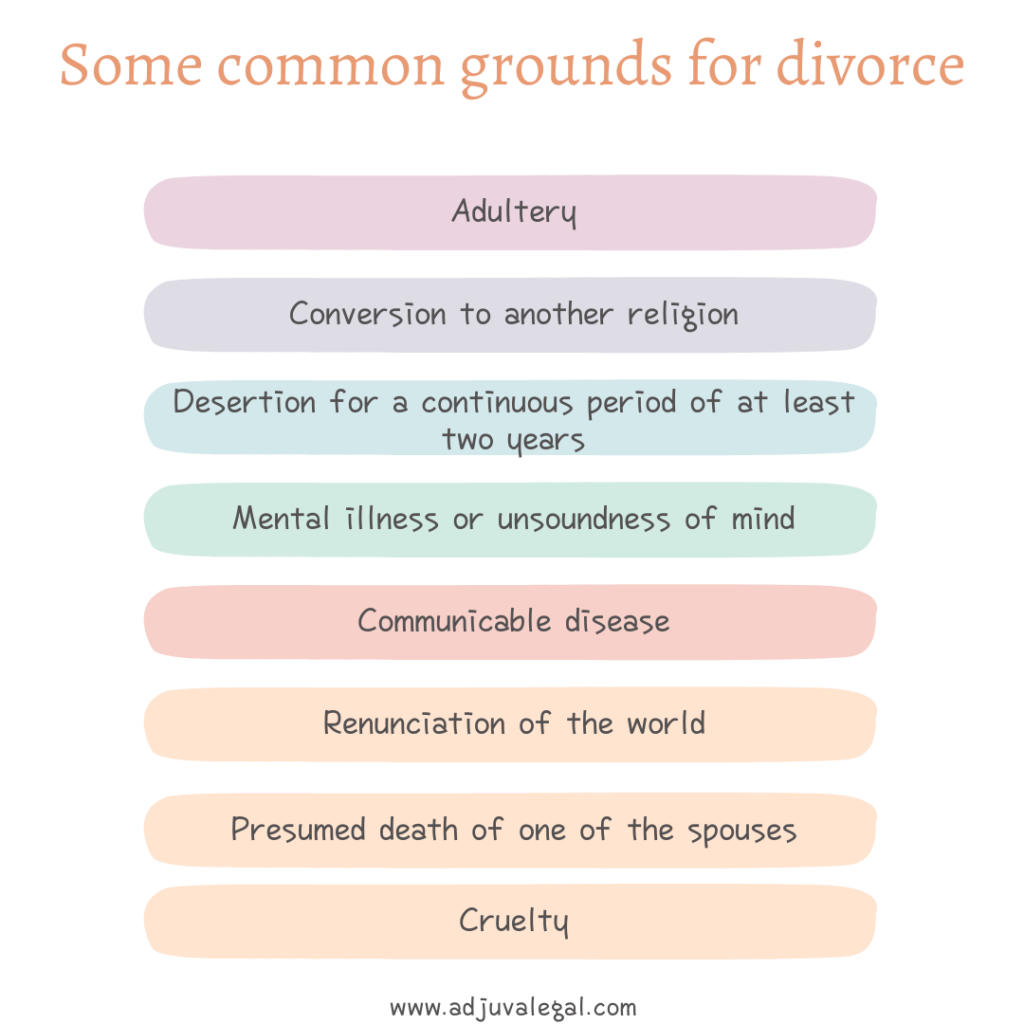In India, the laws governing divorce are contained in various acts, such as the Hindu Marriage Act, 1955, the Special Marriage Act, 1954, the Muslim Personal Law (Shariat) Application Act, 1937, the Dissolution of Muslim Marriages Act, 1939 and the Indian Divorce Act, 1869.
Under the Hindu Marriage Act
- Adultery
- Conversion to another religion
- Desertion for a continuous period of at least two years
- Mental illness or unsoundness of mind
- Communicable disease
- Renunciation of the world
- Presumed death of one of the spouses
- No resumption of cohabitation after a decree of judicial separation
- No resumption of cohabitation after a decree of restitution of conjugal rights
- Cruelty
Under the Special Marriage Act
- Adultery
- Desertion for a continuous period of at least two years
- Mental illness or unsoundness of mind
- Conversion to another religion
- Incurable leprosy
- Venereal disease in a communicable form
- Presumed death of one of the spouses
- No resumption of cohabitation after a decree of judicial separation
- No resumption of cohabitation after a decree of restitution of conjugal rights
- Cruelty
Under the Indian Divorce Act
- Adultery
- Desertion for a continuous period of at least two years
- Conversion to another religion
- Incurable insanity
- Cruelty
- Venereal disease in a communicable form
- Leprosy
- Presumed death of one of the spouses
In India, Muslim divorce laws are governed by the Dissolution of Muslim Marriages Act, 1939 and the Muslim Personal Law (Shariat) Application Act, 1937.
Under the Dissolution of Muslim Marriages Act
- That the husband has not provided maintenance for a period of at least three months.
- That the husband has been sentenced to imprisonment for a term of at least seven years.
- That the husband has failed to perform, without reasonable cause, his marital obligations for a period of at least three years.
- That the husband was impotent at the time of the marriage and continues to be so.
- That the husband has neglected or failed to provide for the petitioner’s maintenance for a period of at least three years.
- That the husband has been guilty of cruelty towards the petitioner.
In India, Muslim personal law, which is governed by the Muslim Personal Law (Shariat) Application Act, 1937, and the Dissolution of Muslim Marriages Act, 1939, applies to Muslims with regard to matters such as marriage, divorce, and inheritance.
Under Muslim personal law, a husband can divorce his wife by simply stating “I divorce you” (known as “talaq”) in the presence of witnesses. This form of divorce, known as “talaq-e-biddat” or “triple talaq,” has been controversial and has been the subject of debate and legal challenges in India. In 2017, the Supreme Court of India declared the practice of triple talaq to be unconstitutional.
There are also other forms of divorce under Muslim personal law, such as “khula,” which is a divorce initiated by the wife and requires the husband’s consent, and “mubarat,” which is a divorce by mutual consent. Apply here for Khula or Mubarat and get Khulanama or Talaqnama within 24 hours.








